Unit 6 Lesson 31 What strange weather 教案
文档属性
| 名称 | Unit 6 Lesson 31 What strange weather 教案 |
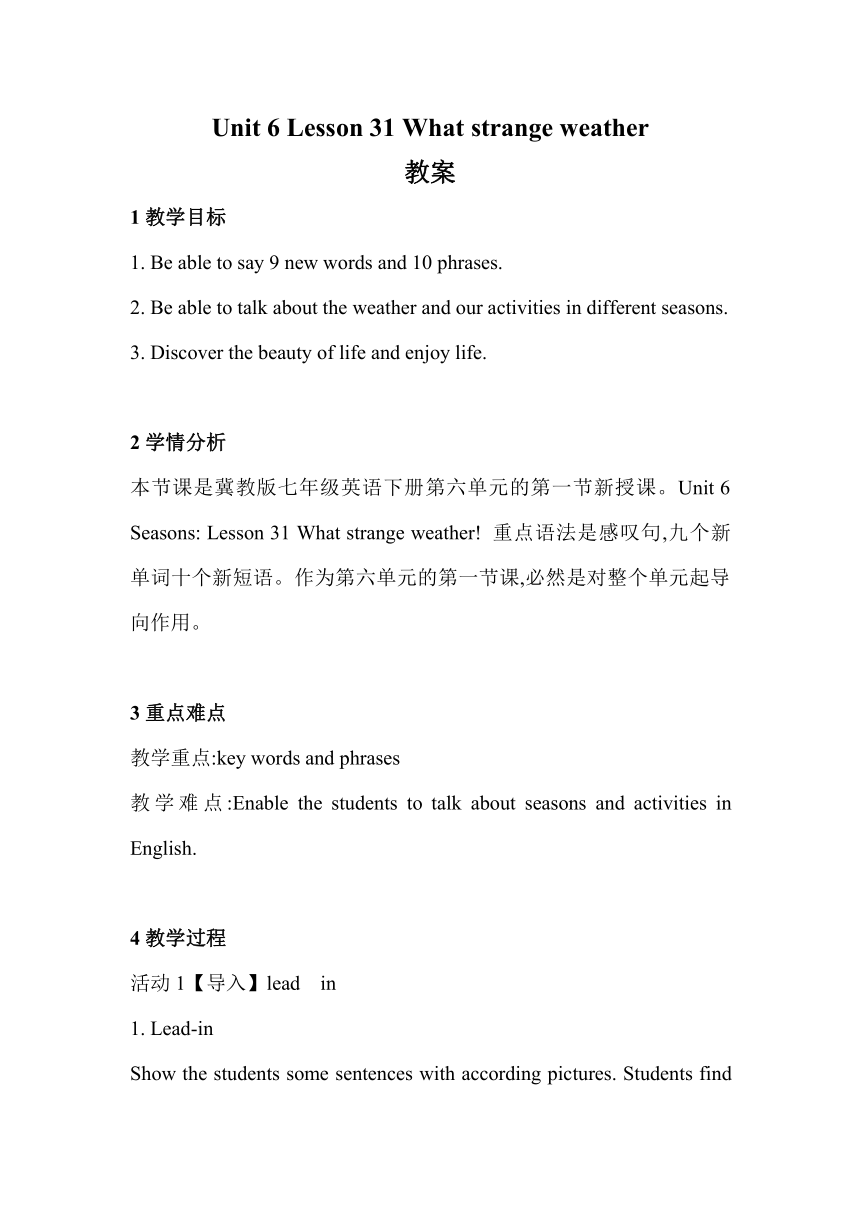
|
|
| 格式 | zip | ||
| 文件大小 | 121.4KB | ||
| 资源类型 | 教案 | ||
| 版本资源 | 冀教版 | ||
| 科目 | 英语 | ||
| 更新时间 | 2017-03-03 20:56:03 | ||
图片预览

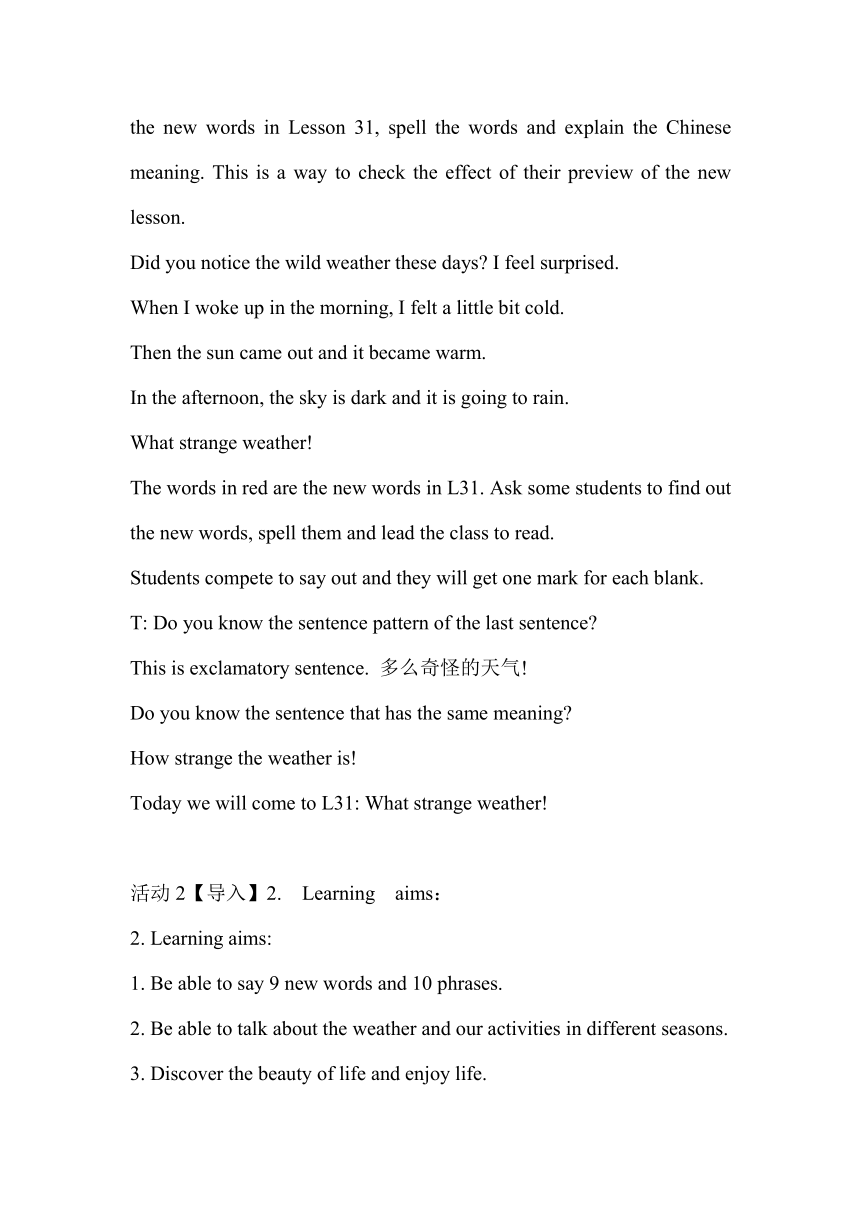
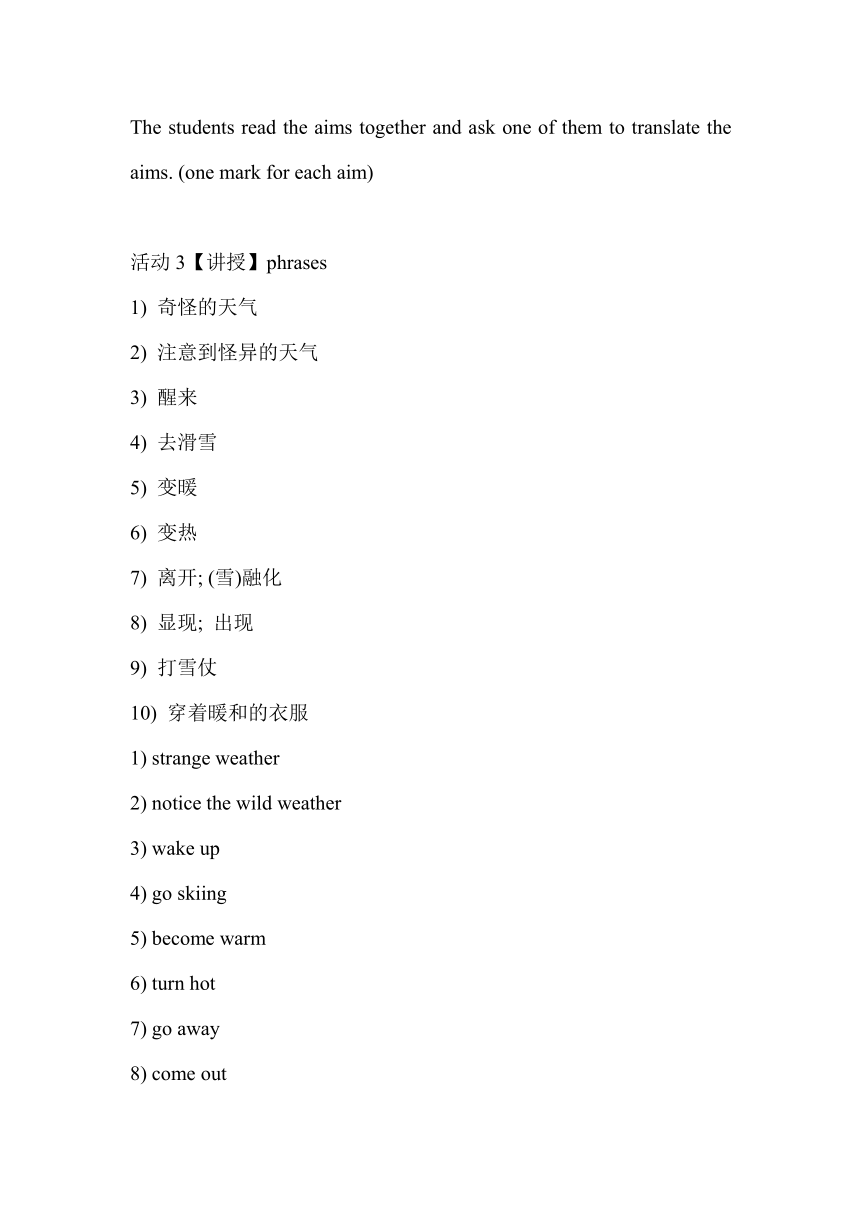
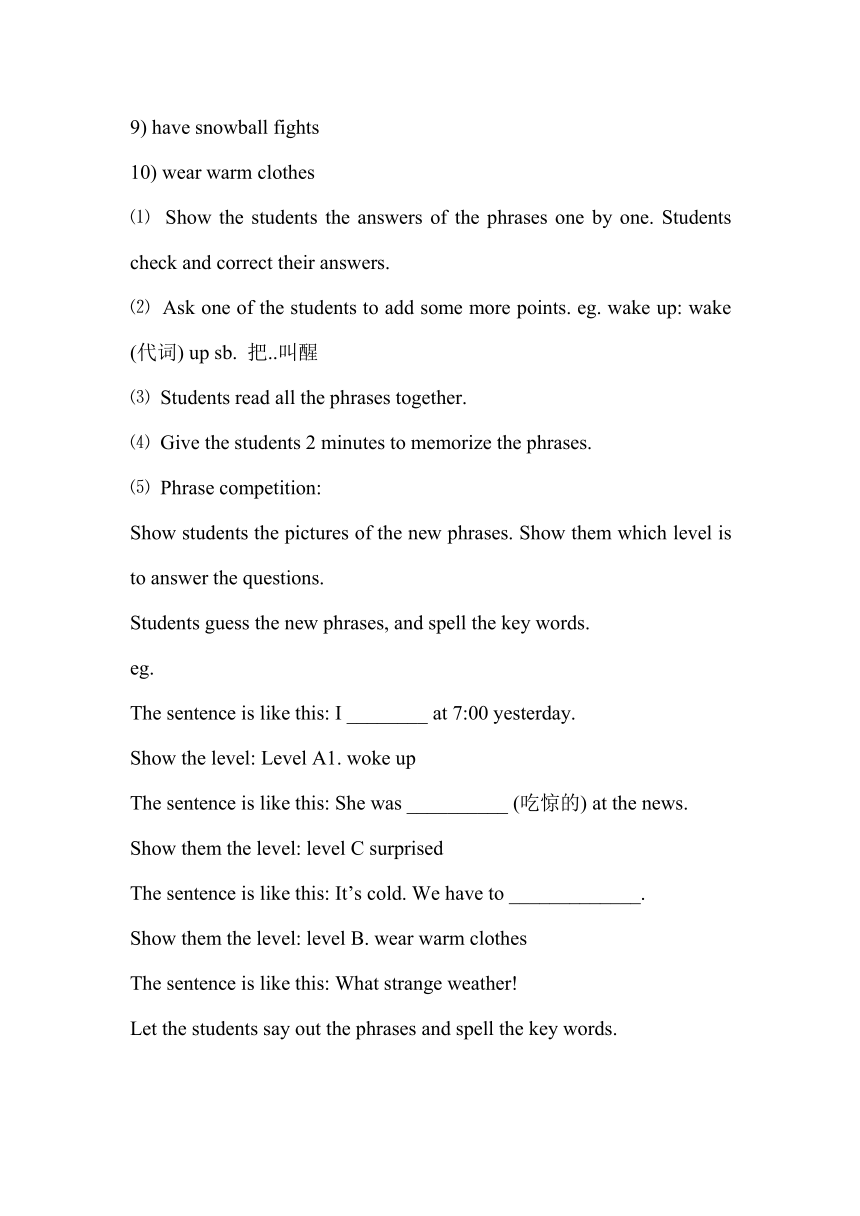
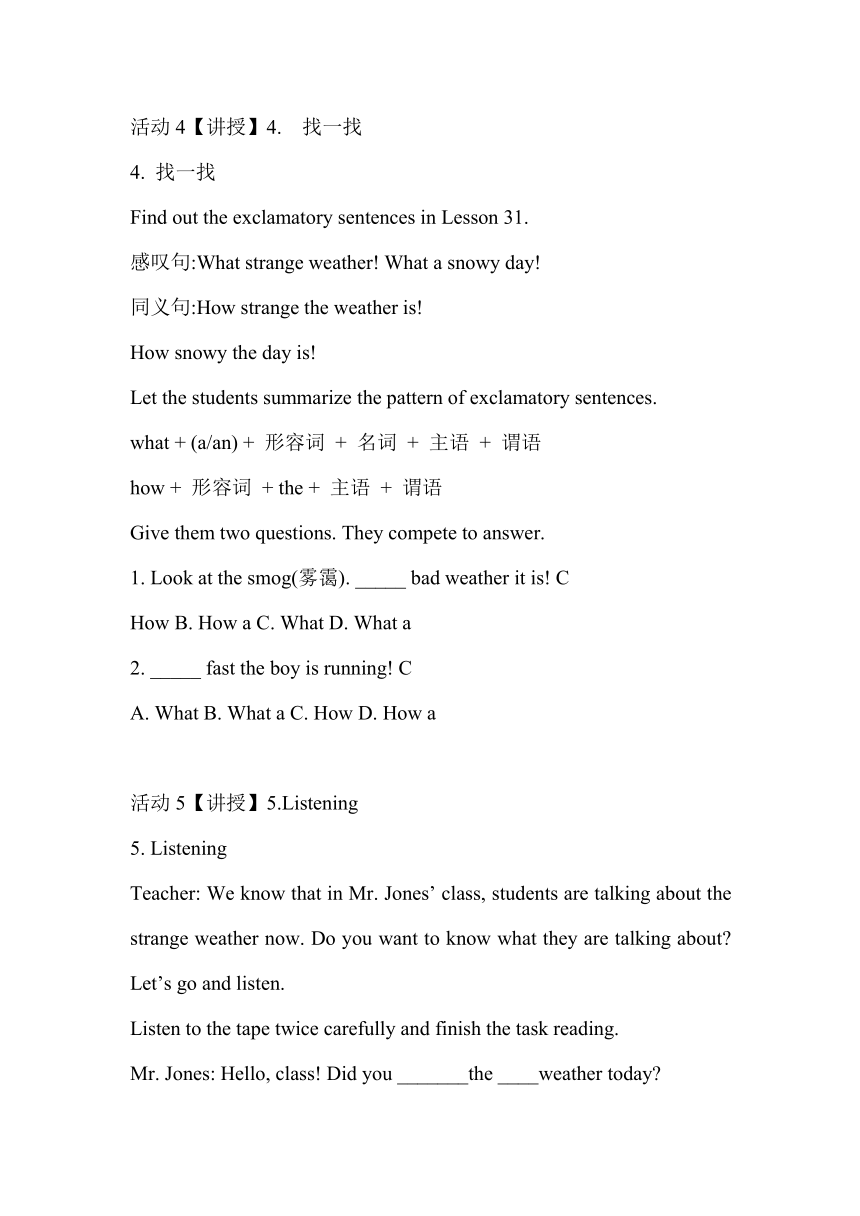
文档简介
Unit
6
Lesson
31
What
strange
weather
教案
1教学目标
1.
Be
able
to
say
9
new
words
and
10
phrases.
2.
Be
able
to
talk
about
the
weather
and
our
activities
in
different
seasons.
3.
Discover
the
beauty
of
life
and
enjoy
life.
2学情分析
本节课是冀教版七年级英语下册第六单元的第一节新授课。Unit
6
Seasons:
Lesson
31
What
strange
weather!
重点语法是感叹句,九个新单词十个新短语。作为第六单元的第一节课,必然是对整个单元起导向作用。
3重点难点
教学重点:key
words
and
phrases
教学难点:Enable
the
students
to
talk
about
seasons
and
activities
in
English.
4教学过程
活动1【导入】lead in
1.
Lead-in
Show
the
students
some
sentences
with
according
pictures.
Students
find
the
new
words
in
Lesson
31,
spell
the
words
and
explain
the
Chinese
meaning.
This
is
a
way
to
check
the
effect
of
their
preview
of
the
new
lesson.
Did
you
notice
the
wild
weather
these
days
I
feel
surprised.
When
I
woke
up
in
the
morning,
I
felt
a
little
bit
cold.
Then
the
sun
came
out
and
it
became
warm.
In
the
afternoon,
the
sky
is
dark
and
it
is
going
to
rain.
What
strange
weather!
The
words
in
red
are
the
new
words
in
L31.
Ask
some
students
to
find
out
the
new
words,
spell
them
and
lead
the
class
to
read.
Students
compete
to
say
out
and
they
will
get
one
mark
for
each
blank.
T:
Do
you
know
the
sentence
pattern
of
the
last
sentence
This
is
exclamatory
sentence.
多么奇怪的天气!
Do
you
know
the
sentence
that
has
the
same
meaning
How
strange
the
weather
is!
Today
we
will
come
to
L31:
What
strange
weather!
活动2【导入】2. Learning aims:
2.
Learning
aims:
1.
Be
able
to
say
9
new
words
and
10
phrases.
2.
Be
able
to
talk
about
the
weather
and
our
activities
in
different
seasons.
3.
Discover
the
beauty
of
life
and
enjoy
life.
The
students
read
the
aims
together
and
ask
one
of
them
to
translate
the
aims.
(one
mark
for
each
aim)
活动3【讲授】phrases
1)
奇怪的天气
2)
注意到怪异的天气
3)
醒来
4)
去滑雪
5)
变暖
6)
变热
7)
离开;
(雪)融化
8)
显现;
出现
9)
打雪仗
10)
穿着暖和的衣服
1)
strange
weather
2)
notice
the
wild
weather
3)
wake
up
4)
go
skiing
5)
become
warm
6)
turn
hot
7)
go
away
8)
come
out
9)
have
snowball
fights
10)
wear
warm
clothes
⑴
Show
the
students
the
answers
of
the
phrases
one
by
one.
Students
check
and
correct
their
answers.
⑵
Ask
one
of
the
students
to
add
some
more
points.
eg.
wake
up:
wake
(代词)
up
sb.
把..叫醒
⑶
Students
read
all
the
phrases
together.
⑷
Give
the
students
2
minutes
to
memorize
the
phrases.
⑸
Phrase
competition:
Show
students
the
pictures
of
the
new
phrases.
Show
them
which
level
is
to
answer
the
questions.
Students
guess
the
new
phrases,
and
spell
the
key
words.
eg.
The
sentence
is
like
this:
I
________
at
7:00
yesterday.
Show
the
level:
Level
A1.
woke
up
The
sentence
is
like
this:
She
was
__________
(吃惊的)
at
the
news.
Show
them
the
level:
level
C
surprised
The
sentence
is
like
this:
It’s
cold.
We
have
to
_____________.
Show
them
the
level:
level
B.
wear
warm
clothes
The
sentence
is
like
this:
What
strange
weather!
Let
the
students
say
out
the
phrases
and
spell
the
key
words.
活动4【讲授】4. 找一找
4.
找一找
Find
out
the
exclamatory
sentences
in
Lesson
31.
感叹句:What
strange
weather!
What
a
snowy
day!
同义句:How
strange
the
weather
is!
How
snowy
the
day
is!
Let
the
students
summarize
the
pattern
of
exclamatory
sentences.
what
+
(a/an)
+
形容词
+
名词
+
主语
+
谓语
how
+
形容词
+
the
+
主语
+
谓语
Give
them
two
questions.
They
compete
to
answer.
1.
Look
at
the
smog(雾霭).
_____
bad
weather
it
is!
C
How
B.
How
a
C.
What
D.
What
a
2.
_____
fast
the
boy
is
running!
C
A.
What
B.
What
a
C.
How
D.
How
a
活动5【讲授】5.Listening
5.
Listening
Teacher:
We
know
that
in
Mr.
Jones’
class,
students
are
talking
about
the
strange
weather
now.
Do
you
want
to
know
what
they
are
talking
about
Let’s
go
and
listen.
Listen
to
the
tape
twice
carefully
and
finish
the
task
reading.
Mr.
Jones:
Hello,
class!
Did
you
_______the
____weather
today
Jenny:
Yes,
I
did!
I
________up
this
morning
and
I
was
________!
What
a
snowy
day!
Danny:
Yeah!
The
sun
came
out
and
it
________warm.
All
the
snow
went
away.
Kim:
And
right
now
the
sky
is
dark.
It’s
going
to
rain.
Mr.
Jones:
Yes,
you’re
right.
What
________weather!
Check
answers
one
by
one.
Students
read
the
whole
sentence
and
spell
the
words.
The
answers
are:
notice,
wild,
woke,
surprised,
became
and
strange.
活动6【讲授】6.Reading
6.
Reading
Teacher:
Lily,
What
is
your
favourite
season
Lily:
Autumn.
Teacher:
How
about
you,
Tom
Lily:
Well,
I
like
spring
best.
Teacher:
Students
in
the
class
are
also
talking
about
their
favourite
season.
Do
you
want
to
know
more
Students:
Yes!
Teacher:
Now,
everyone.
Please
stand
up
and
read
in
groups.
When
you
finish
reading,
do
the
following
tasks.
1)
Kim’s
favourite
season
is
summer.
(T/F)____.
2)
When
Jenny
woke
up
this
morning,
she
was_________
at
the
wild
weather.
3)
What
is
Steven’s
favourite
season
Why
4)
What
can
Danny
do
in
winter
5)翻译:The
sun
came
out
and
it
became
warm.
All
the
snow
went
away.
1)
Ask
students
it
is
true
or
false.
If
it
is
false,
tell
us
the
correct
sentence.
2)
Fill
in
the
blanks
and
translate
the
sentence.
surprised
3)
Answers
the
question.
Spring.
Because
spring
usually
means
green
trees,
beautiful
flowers
and
playing
in
the
rain.
4)
Answers
the
question.
He
can
go
skiing
and
skating.
And
he
can
also
have
snowball
fights.
5)太阳出来了,天气变得暖和起来。所有的雪都融化了。
活动7【活动】7.Teamwork
7.
Teamwork
Topic:
Which
season
do
you
like
best
Show
them
the
pictures
of
the
four
seasons.
These
are
the
pictures
of
spring.
The
beautiful
sceneries
of
spring
and
people’s
activities:
play
in
the
rain
and
fly
kites.
These
pictures
are
about
the
pictures
about
summer.
We
go
to
the
sea
and
go
swimming
in
summer.
These
pictures
are
about
the
pictures
about
autumn.
We
pick
vegetables
and
fruit
and
go
fishing.
These
pictures
are
about
the
pictures
about
winter.
We
make
a
snowman,
go
skiing
and
have
snowball
fights.
Topic:
Which
season
do
you
like
best
Why
What
can
you
see
in
the
season
What
do
you
do
like
to
do
that
time
How
do
you
feel
Make
a
dialogue
about
your
favorite
season.
Time
for
preparation:
2
minutes.
Show
time:
2
minutes.
All
together
three
marks:
one
mark
for
contents,
one
mark
for
excellence,
one
mark
for
correctness.
活动8【练习】8.Sentences
8.
Sentences
Teacher:
Ok,
everyone.
Your
performance
of
the
teamwork
surprised
me.
I
am
surprised
at
your
performance.
I
am
surprised
to
hear
your
dialogue.
Which
word
do
I
use
most
frequently
Students:
Surprise!
Teacher:
Ok,
let’s
come
to
the
sentences
part
to
dig
in
“surprise”.
Here
are
six
sentences
as
examples.
The
news
surprised
me.
I’m
surprised
to
hear
the
news.
I’m
surprised
at
the
surprising
news.
I
have
a
surprise
for
you.
To
my
surprise,
he
won
the
first
prize.
The
little
girl
looked
at
him
in
surprise.
There
are
three
example
sentences.
Summarize
the
usage
of
“surprise”.
Ask
students
to
try
to
do
it.
V.
使…惊讶
结构:surprise
sb.
Adj.
be
surprised
to
do
sth.
做某事很吃惊
be
surprised
at
sth.
对某事感到很吃惊
n.
to
one's
surprise
“使某人吃惊的是…”
in
surprise
“惊奇地”
There
are
two
following
questions.
1.
To
my
____,
he
finished
the
job
on
time.
C
surprised
B.
surprising
C.
surprise
2.
I
was
____
at
the
____
result.
C
surprised;
surprised
surprising;
surprising
surprised;
surprising
活动9【测试】9.
Share
some
pictures
with
all
the
classmates.
Teacher:
I
took
these
photos
on
my
way
home
yesterday.
In
fact,
they
are
quite
common
in
our
daily
life.
We
even
never
realized
how
cute
and
lovely
they
are!
What
a
pity!
Just
open
up
your
heart
and
you
will
see
beauty
everywhere.
Even
when
you
are
in
trouble,
please
do
not
give
up
hope.
Do
believe
that
good
things
are
coming
to
you!
活动10【作业】作业
Write
a
report
about
your
favourite
season.
6
Lesson
31
What
strange
weather
教案
1教学目标
1.
Be
able
to
say
9
new
words
and
10
phrases.
2.
Be
able
to
talk
about
the
weather
and
our
activities
in
different
seasons.
3.
Discover
the
beauty
of
life
and
enjoy
life.
2学情分析
本节课是冀教版七年级英语下册第六单元的第一节新授课。Unit
6
Seasons:
Lesson
31
What
strange
weather!
重点语法是感叹句,九个新单词十个新短语。作为第六单元的第一节课,必然是对整个单元起导向作用。
3重点难点
教学重点:key
words
and
phrases
教学难点:Enable
the
students
to
talk
about
seasons
and
activities
in
English.
4教学过程
活动1【导入】lead in
1.
Lead-in
Show
the
students
some
sentences
with
according
pictures.
Students
find
the
new
words
in
Lesson
31,
spell
the
words
and
explain
the
Chinese
meaning.
This
is
a
way
to
check
the
effect
of
their
preview
of
the
new
lesson.
Did
you
notice
the
wild
weather
these
days
I
feel
surprised.
When
I
woke
up
in
the
morning,
I
felt
a
little
bit
cold.
Then
the
sun
came
out
and
it
became
warm.
In
the
afternoon,
the
sky
is
dark
and
it
is
going
to
rain.
What
strange
weather!
The
words
in
red
are
the
new
words
in
L31.
Ask
some
students
to
find
out
the
new
words,
spell
them
and
lead
the
class
to
read.
Students
compete
to
say
out
and
they
will
get
one
mark
for
each
blank.
T:
Do
you
know
the
sentence
pattern
of
the
last
sentence
This
is
exclamatory
sentence.
多么奇怪的天气!
Do
you
know
the
sentence
that
has
the
same
meaning
How
strange
the
weather
is!
Today
we
will
come
to
L31:
What
strange
weather!
活动2【导入】2. Learning aims:
2.
Learning
aims:
1.
Be
able
to
say
9
new
words
and
10
phrases.
2.
Be
able
to
talk
about
the
weather
and
our
activities
in
different
seasons.
3.
Discover
the
beauty
of
life
and
enjoy
life.
The
students
read
the
aims
together
and
ask
one
of
them
to
translate
the
aims.
(one
mark
for
each
aim)
活动3【讲授】phrases
1)
奇怪的天气
2)
注意到怪异的天气
3)
醒来
4)
去滑雪
5)
变暖
6)
变热
7)
离开;
(雪)融化
8)
显现;
出现
9)
打雪仗
10)
穿着暖和的衣服
1)
strange
weather
2)
notice
the
wild
weather
3)
wake
up
4)
go
skiing
5)
become
warm
6)
turn
hot
7)
go
away
8)
come
out
9)
have
snowball
fights
10)
wear
warm
clothes
⑴
Show
the
students
the
answers
of
the
phrases
one
by
one.
Students
check
and
correct
their
answers.
⑵
Ask
one
of
the
students
to
add
some
more
points.
eg.
wake
up:
wake
(代词)
up
sb.
把..叫醒
⑶
Students
read
all
the
phrases
together.
⑷
Give
the
students
2
minutes
to
memorize
the
phrases.
⑸
Phrase
competition:
Show
students
the
pictures
of
the
new
phrases.
Show
them
which
level
is
to
answer
the
questions.
Students
guess
the
new
phrases,
and
spell
the
key
words.
eg.
The
sentence
is
like
this:
I
________
at
7:00
yesterday.
Show
the
level:
Level
A1.
woke
up
The
sentence
is
like
this:
She
was
__________
(吃惊的)
at
the
news.
Show
them
the
level:
level
C
surprised
The
sentence
is
like
this:
It’s
cold.
We
have
to
_____________.
Show
them
the
level:
level
B.
wear
warm
clothes
The
sentence
is
like
this:
What
strange
weather!
Let
the
students
say
out
the
phrases
and
spell
the
key
words.
活动4【讲授】4. 找一找
4.
找一找
Find
out
the
exclamatory
sentences
in
Lesson
31.
感叹句:What
strange
weather!
What
a
snowy
day!
同义句:How
strange
the
weather
is!
How
snowy
the
day
is!
Let
the
students
summarize
the
pattern
of
exclamatory
sentences.
what
+
(a/an)
+
形容词
+
名词
+
主语
+
谓语
how
+
形容词
+
the
+
主语
+
谓语
Give
them
two
questions.
They
compete
to
answer.
1.
Look
at
the
smog(雾霭).
_____
bad
weather
it
is!
C
How
B.
How
a
C.
What
D.
What
a
2.
_____
fast
the
boy
is
running!
C
A.
What
B.
What
a
C.
How
D.
How
a
活动5【讲授】5.Listening
5.
Listening
Teacher:
We
know
that
in
Mr.
Jones’
class,
students
are
talking
about
the
strange
weather
now.
Do
you
want
to
know
what
they
are
talking
about
Let’s
go
and
listen.
Listen
to
the
tape
twice
carefully
and
finish
the
task
reading.
Mr.
Jones:
Hello,
class!
Did
you
_______the
____weather
today
Jenny:
Yes,
I
did!
I
________up
this
morning
and
I
was
________!
What
a
snowy
day!
Danny:
Yeah!
The
sun
came
out
and
it
________warm.
All
the
snow
went
away.
Kim:
And
right
now
the
sky
is
dark.
It’s
going
to
rain.
Mr.
Jones:
Yes,
you’re
right.
What
________weather!
Check
answers
one
by
one.
Students
read
the
whole
sentence
and
spell
the
words.
The
answers
are:
notice,
wild,
woke,
surprised,
became
and
strange.
活动6【讲授】6.Reading
6.
Reading
Teacher:
Lily,
What
is
your
favourite
season
Lily:
Autumn.
Teacher:
How
about
you,
Tom
Lily:
Well,
I
like
spring
best.
Teacher:
Students
in
the
class
are
also
talking
about
their
favourite
season.
Do
you
want
to
know
more
Students:
Yes!
Teacher:
Now,
everyone.
Please
stand
up
and
read
in
groups.
When
you
finish
reading,
do
the
following
tasks.
1)
Kim’s
favourite
season
is
summer.
(T/F)____.
2)
When
Jenny
woke
up
this
morning,
she
was_________
at
the
wild
weather.
3)
What
is
Steven’s
favourite
season
Why
4)
What
can
Danny
do
in
winter
5)翻译:The
sun
came
out
and
it
became
warm.
All
the
snow
went
away.
1)
Ask
students
it
is
true
or
false.
If
it
is
false,
tell
us
the
correct
sentence.
2)
Fill
in
the
blanks
and
translate
the
sentence.
surprised
3)
Answers
the
question.
Spring.
Because
spring
usually
means
green
trees,
beautiful
flowers
and
playing
in
the
rain.
4)
Answers
the
question.
He
can
go
skiing
and
skating.
And
he
can
also
have
snowball
fights.
5)太阳出来了,天气变得暖和起来。所有的雪都融化了。
活动7【活动】7.Teamwork
7.
Teamwork
Topic:
Which
season
do
you
like
best
Show
them
the
pictures
of
the
four
seasons.
These
are
the
pictures
of
spring.
The
beautiful
sceneries
of
spring
and
people’s
activities:
play
in
the
rain
and
fly
kites.
These
pictures
are
about
the
pictures
about
summer.
We
go
to
the
sea
and
go
swimming
in
summer.
These
pictures
are
about
the
pictures
about
autumn.
We
pick
vegetables
and
fruit
and
go
fishing.
These
pictures
are
about
the
pictures
about
winter.
We
make
a
snowman,
go
skiing
and
have
snowball
fights.
Topic:
Which
season
do
you
like
best
Why
What
can
you
see
in
the
season
What
do
you
do
like
to
do
that
time
How
do
you
feel
Make
a
dialogue
about
your
favorite
season.
Time
for
preparation:
2
minutes.
Show
time:
2
minutes.
All
together
three
marks:
one
mark
for
contents,
one
mark
for
excellence,
one
mark
for
correctness.
活动8【练习】8.Sentences
8.
Sentences
Teacher:
Ok,
everyone.
Your
performance
of
the
teamwork
surprised
me.
I
am
surprised
at
your
performance.
I
am
surprised
to
hear
your
dialogue.
Which
word
do
I
use
most
frequently
Students:
Surprise!
Teacher:
Ok,
let’s
come
to
the
sentences
part
to
dig
in
“surprise”.
Here
are
six
sentences
as
examples.
The
news
surprised
me.
I’m
surprised
to
hear
the
news.
I’m
surprised
at
the
surprising
news.
I
have
a
surprise
for
you.
To
my
surprise,
he
won
the
first
prize.
The
little
girl
looked
at
him
in
surprise.
There
are
three
example
sentences.
Summarize
the
usage
of
“surprise”.
Ask
students
to
try
to
do
it.
V.
使…惊讶
结构:surprise
sb.
Adj.
be
surprised
to
do
sth.
做某事很吃惊
be
surprised
at
sth.
对某事感到很吃惊
n.
to
one's
surprise
“使某人吃惊的是…”
in
surprise
“惊奇地”
There
are
two
following
questions.
1.
To
my
____,
he
finished
the
job
on
time.
C
surprised
B.
surprising
C.
surprise
2.
I
was
____
at
the
____
result.
C
surprised;
surprised
surprising;
surprising
surprised;
surprising
活动9【测试】9.
Share
some
pictures
with
all
the
classmates.
Teacher:
I
took
these
photos
on
my
way
home
yesterday.
In
fact,
they
are
quite
common
in
our
daily
life.
We
even
never
realized
how
cute
and
lovely
they
are!
What
a
pity!
Just
open
up
your
heart
and
you
will
see
beauty
everywhere.
Even
when
you
are
in
trouble,
please
do
not
give
up
hope.
Do
believe
that
good
things
are
coming
to
you!
活动10【作业】作业
Write
a
report
about
your
favourite
season.
同课章节目录
- Unit 1 A Trip to the Silk Road
- Lesson 1 A Trip to China
- Lesson 2 Meet You in Beijing
- Lesson 3 A Visit to Xi'an
- Lesson 4 A Visit to Lanzhou
- Lesson 5 Another Stop along the Silk Road
- Lesson 6 Jenny's Diary
- Unit 2 It's Show Time!
- Lesson 7 What's Your Project about?
- Lesson 8 Marco Polo and the Silk Road
- Lesson 9 Danny's School Project
- Lesson 10 Music and Dance
- Lesson 11 Food in China
- Lesson 12 A Blog about the Silk Road
- Unit 3 School Life
- Lesson 13 How Is School Going?
- Lesson 14 Jenny's School Life
- Lesson 15 Making a Difference
- Lesson 16 We Are with You!
- Lesson 17 School Science Fai
- Lesson 18 Teaching in China
- Unit 4 After-School Activities
- Lesson 19 A Dinner Date
- Lesson 20 Join Our Club!
- Lesson 21 What Is Your Club Type?
- Lesson 22 Big Plans for the Weekend
- Lesson 23 A Weekend with Grandma
- Lesson 24 How was Your Weekend?
- Unit 5 I Love Learning English!
- Lesson 25 A Phone Friend
- Lesson 26 Online Phone Calls
- Lesson 27 Amazing English
- Lesson 28 How Do I Learn English?
- Lesson 29 A Door to the World
- Lesson 30 Writing an E-mail in English
- Unit 6 Seasons
- Lesson 31 What Strange Weather!
- Lesson 32 I Can't Wait for Winter!
- Lesson 33 Kim's Favourite Season
- Lesson 34 Steven's Report
- Lesson 35 Surfing in Sydney
- Lesson 36 Spring in China
- Unit 7 Sports and Good Health
- Lesson 37 You Are What You Eat!
- Lesson 38 Stay Healthy!
- Lesson 39 Danny's Report
- Lesson 40 Move Your Body
- Lesson 41 Were People Healthy Then?
- Lesson 42 Know Yourself
- Unit 8 Summer Holiday Is Coming!
- Lesson 43 Have a Good Summer!
- Lesson 44 Volunteering in Summe
- Lesson 45 Baseball Season
- Lesson 46 Get Ready for Summer Holiday!
- Lesson 47 Summer Plans
- Lesson 48 Li Ming's Summer Holiday
